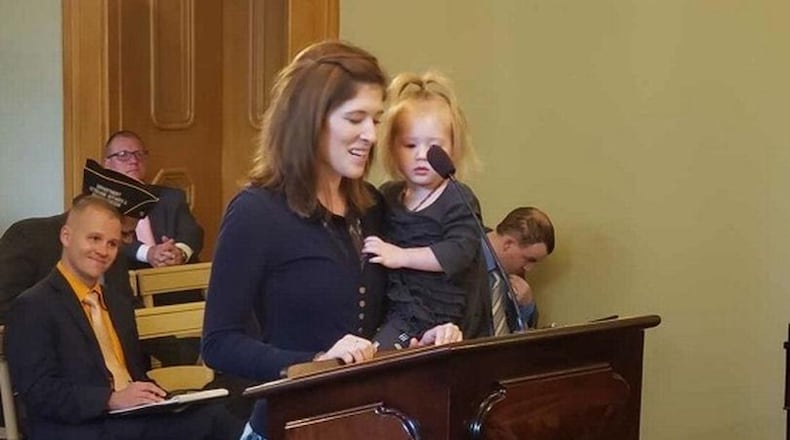COVID-19 isn’t making the problem easier. Military.com reported in May that according to a weekly survey of military families, 18% of military spouses who were working prior to the COVID-19 crisis have lost their jobs or were unable to work due to the pandemic.
Seven out of 10 military families live outside military installations, said Rosemary Williams, one of the report’s authors and a former deputy assistant secretary of defense for military community and family policy.
“The employment issue is staggering, and it has direct implications for national security,” Williams said in an interview with the Dayton Daily News. “Since the beginning of the military, the one thing that can distract the service member downrange is the health, safety and welfare of their family.”
With the modern military family, two incomes are sometimes necessary, not just desirable, she added. Military life sometimes demands a second income.
Even in good times, it can be challenging finding the right job when employers know that a military spouse may have to move in two to four years.
Shonte Gonzalez is a community readiness consultant at Wright-Patterson Air Force Base, overseeing the transition assistance program there, working to provide spouses with connections to jobs.
“It’s not easy transitioning to new cities, because when you say the words ‘military spouse,’ that’s very hard,” Gonzalez said, adding: “We move every two years, we move every three years. Some companies ... they want that person to stay.”
“Inherently, there is a sense of isolation when families move to new bases or duty stations,” Williams said.
The Deloitte report notes that military spouses are often very employable. Some 45% of military spouses hold bachelors or advanced degrees.
“If you want a hard-charging cyber-warrior who gets it and gets the job done, you’re going to have a spouse who also wants a career,” Williams said.
“That spouse is going to give you the best darn work they can give you for your company,” Gonzalez said.
Williams said at some point, military couples may tell themselves: “‘You know what? It’s just easier for me to get a job if we leave the military.' Or it becomes such a pain point in the family, for a variety of reasons -- and it impacts readiness.”
A few new factors are helping somewhat. Employers expect Millennials to jump from job to job every few years. And telework and remote work are increasingly embraced, which opens more doors.
“I would wager a guess that when things even out after COVID, there will be more remote work and teleworking and more opportunities, Williams said.
Ohio has strengths going for it, Williams agreed. She hailed legislation signed by Gov. Mike DeWine this year that requires state occupational licensing agencies to issue temporary licenses to uniformed service members and spouses who are validly licensed elsewhere and have moved to Ohio for military duty.
“This is a huge issue,” Williams said.
Joe Mariani, also a report co-author and a former Marine Corps officer, said the problem varies by community. Where labor markets are hot, the problem is less acute
“Some of the services get lucky where they are located, perhaps the Air Force,” Mariani said. “Some of the services, less so.”
He added: “It can change from move to move and base to base.”
Gov. Mike DeWine signed new laws this year that are designed to make Ohio a more attractive destination for military families.
One law allows military families who move into Ohio to qualify for lower in-state tuition reserved for longtime residents. The governor also signed Ohio Senate Bill 7 in a January visit to the National Museum of the U.S. Air Force, requiring state occupational licensing agencies to issue temporary licenses or certificates to uniformed service members and their spouses who are validly licensed in another jurisdiction and have moved to Ohio for military duty.
That bill often saves family members a great deal of time and money, sparing them the need to secure new occupational licenses.
Dayton advocates have increasingly emphasized making Ohio and the Dayton region more attractive to military families in ways they hope military decision-makers will notice.
Gonzalez knows of regional companies who consider themselves “military-friendly” and are open to hiring military spouses, but she and a Wright-Patterson spokeswoman declined to name them, saying they could not endorse individual companies. Instead, they referred job-seekers to https://myseco.militaryonesource.mil/portal/, the military spouse education and career opportunities portal.
“We do have some (military-friendly companies) between Cincinnati, Dayton and Columbus,” Gonzalez said.
By the numbers
92: % of military spouses are women.
80: % of military spouses are 40 or younger
45: % of military spouses hold bachelors or advanced degrees.
31-53: % of military spouses report being underemployed.
Source: Deloitte report, “Military Spouse Unemployment”
Resources for military families:
Military One Source: https://www.militaryonesource.mil/
For state statistics and license recognition information: https://statepolicy.militaryonesource.mil/faq
About the Author

